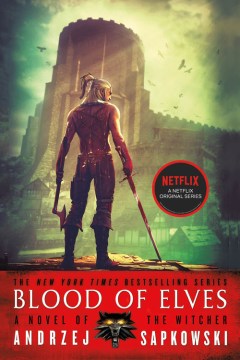BOOK INFORMATION
Genres: Fantasy
First Released: 1994
Part of a Series: Yes
Preceded By: Sword of Destiny
Followed By: The Time of Contempt
Call Number: FANTASY SAPKOWSKI
Eyan’s Rating: 3 out of 5 Stars
Find it: Physical copy on the 3rd floor, eAudiobook and eBook through Libby, Audiobook on CD on the 2nd floor
Summary
Humans, dwarves, gnomes, and elves have lived together in relative peace for over a century. But times have changed, the uneasy peace is over, and now the races are fighting again. The only good elf, it seems, is a dead elf. Geralt of Rivia, the cunning assassin known as The Witcher, has been waiting for the birth of a prophesied child. This child has the power to change the world—for good or evil. As the threat of war hangs over the land and the child is hunted for her extraordinary powers, it will become Geralt’s responsibility to protect them all—and the Witcher never accepts defeat. The Witcher returns in this sequel to The Last Wish, as the inhabitants of his world become embroiled in a state of total war.
Provided by the Publisher
Review
Blood of Elves by Andrej Sapkowski is the first full-length novel but the third chronological book in the Witcher series (the first two books are short story collections). It’s a great place to begin reading if you prefer full-length novels, as the first two collections can be enjoyed at any point during Geralt’s timeline. Fans of the television show (whose 2nd season was released on Netflix earlier this year) will find Blood of Elves recognizable, as many of the characters and plot points made appearances in episodes of season 2.
I love the world of The Witcher. I never played the video games, though I hear The Witcher 3: Wild Hunt is widely considered an excellent game, even now seven years after its initial release. Sapkopwski loosely based his world-building on Slavic mythology, making some of the monsters recognizable to me as a medieval scholar. I always find it fun to read authors from other countries and their take on medieval writing stereotypes. For some context, Sapkowski is Polish, and all the books were first released in that language.
In that regard, Geralt, Ciri and Yennifer live up to the expectation. The brooding warrior with a heart of gold (Geralt), the gorgeous sorcerous who just wants to be a mother (Yennifer) and Ciri, a young girl with a destiny that far outweighs her young 13-year-old self. I wanted to love them all because, in the show, I do. However, as a modern thinker, I had a lot of problems becoming immersed in the world because of a few things.
Yennifer’s story arc has thus far largely reduced her to stereotypes of womanhood. She has gained all the power imaginable, and yet she’s just kind of petty? She’s a stiff caricature of what I’d envision a powerful woman to be, and she’s reduced down to damsel in distress or pining for her lost chance at motherhood often enough that it makes it harder to buy into her fierce act with Geralt.
And Dandelion from the books is painfully bad. My absolute favorite part of the Netflix show is Jaskier (the name change is a translation to English that the show axed). While the book’s Dandelion is still brilliant and clever, he is the definition of a womanizer, and in a bad way. There’s a lot of commentary from him and Geralt about the attractiveness of women, but it’s in the way they talk about it that really bothered me. We’re talking about really detailed fatphobia, misogyny and much more. I tried to remember that this was translated from Polish to English AND that it is a product of its time in the early 90s in a different country. So the internalized sexism and racism prevalent in Fantasy novels is definitely present here, and I think more so than from some contemporary authors.
I’m not going to say read something else instead, but I am going to say I wish the books were better. I love the show, and it’s rare that I’d say the show is better than the books, but this is definitely that case. I’m going to check out the graphic novel collection from Dark Horse because I wonder if a more modern author bringing the characters to life would suit me better. We have that, too: The Witcher graphic novel by Paul Tobin.

